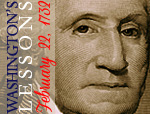02.18.13

Washington’s Lessons: Control Your Weaknesses
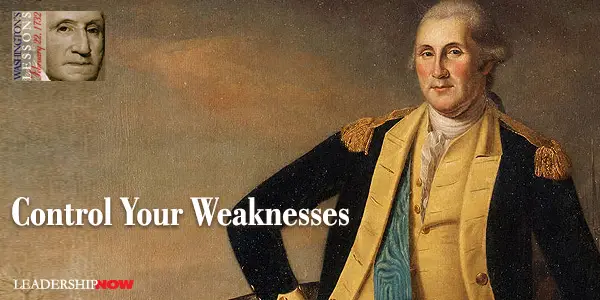 D
DEVELOPING our strengths, which represent our capacities, is where we should lead from. But as Washington understood, we must deal with and manage our weaknesses or they may undo any gains we derive from our strengths.
Washington’s success, in part, came from knowing his weaknesses and controlling them. Washington had a bad temper. His awareness of it allowed him to choose to end it quickly and repair any damage it had done. He did not act on his emotions, but waited until his mind was clear.
Richard Brookhiser wrote, “There was a norm for a leader’s behavior, a range within which he should act, and when Washington felt he had been tugged away from it, he would tug himself back.
This quality caused even those who had been on the receiving end of his temper to remember him well. They did so because as Brookhiser put it, “he had earned their admiration over the long haul by keeping his eye on the task at hand, resisting the distraction of losing his temper” and “because he had spared them much of his anger, and leavened it, when he had not, with impartiality and consideration.”
* * *  Like us on Instagram and Facebook for additional leadership and personal development ideas.

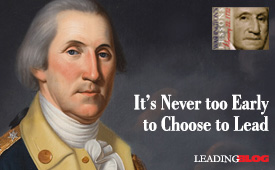 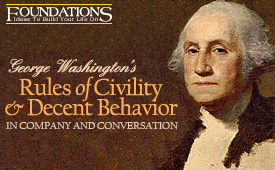
Posted by Michael McKinney at 05:59 PM
Permalink
| Comments (0)
| Washington's Lessons

Washington’s Lessons: 30 Surprising Facts About George Washington
IN Washington: A Life, Ron Chernow calls Washington “the most famously elusive figure in American history.” Chernow offers these facts about George Washington.
- Washington was the only major founder who lacked a college education. John Adams went to Harvard, James Madison to Princeton, and Alexander Hamilton to Columbia, making Washington self-conscious about what he called his "defective education."
- Washington never had wooden teeth. He wore dentures that were made of either walrus or elephant ivory and were fitted with real human teeth. Over time, as the ivory got cracked and stained, it resembled the grain of wood. Washington may have purchased some of his teeth from his own slaves.
- Washington had a strangely cool and distant relationship with his mother. During the Revolutionary War and her son's presidency, she never uttered a word of praise about him and she may even have been a Tory. No evidence exists that she ever visited George and Martha Washington at Mount Vernon. Late in the Revolutionary War, Mary Washington petitioned the Virginia legislature for financial relief, pleading poverty—and, by implication, neglect by her son. Washington, who had been extremely generous to his mother, was justly indignant.
- Even as a young man, Washington seemed to possess a magical immunity to bullets. In one early encounter in the French and Indian War, he absorbed four bullets in his coat and hat and had two horses shot from under him yet emerged unscathed. This led one Indian chief to predict that some higher power was guiding him to great events in the future.
- By age 30 Washington had survived smallpox, malaria, dysentery, and other diseases. Although he came from a family of short-lived men, he had an iron constitution and weathered many illnesses that would have killed a less robust man. He lived to the age of 67.
- While the Washingtons were childless—it has always been thought that George Washington was sterile—they presided over a household teeming with children. Martha had two children from her previous marriage and she and George later brought up two grandchildren as well, not to mention countless nieces and nephews.
- That Washington was childless proved a great boon to his career. Because he had no heirs, Americans didn't worry that he might be tempted to establish a hereditary monarchy. And many religious Americans believed that God had deliberately deprived Washington of children so that he might serve as Father of His Country.
- Though he tried hard to be fair and took excellent medical care of his slaves, Washington could be a severe master. His diaries reveal that during one of the worst cold snaps on record in Virginia—when Washington himself found it too cold to ride outside—he had his field slaves out draining swamps and performing other arduous tasks.
- For all her anxiety about being constantly in a battle zone, Martha Washington spent a full half of the Revolutionary War with her husband—a major act of courage that has largely gone unnoticed.
- Washington was obsessed with his personal appearance, which extended to his personal guard during the war. Despite wartime austerity and a constant shortage of soldiers, he demanded that all members of his personal guard be between 5'8" and 5'10"; a year later, he narrowed the range to 5'9" to 5'10."
- While Washington lost more battles than he won, he still ranks as a great general. His greatness lay less in his battlefield brilliance—he committed some major strategic blunders—than in his ability to hold his ragged army intact for more than eight years, keeping the flame of revolution alive.
- Washington ran his own spy network during the war and was often the only one privy to the full scope of secret operations against the British. He anticipated many techniques of modern espionage, including the use of misinformation and double agents.
- Washington tended his place in history with extreme care. Even amid wartime stringency, he got Congress to appropriate special funds for a full-time team of secretaries who spent two years copying his wartime papers into beautiful ledgers.
- For thirty years, Washington maintained an extraordinary relationship with his slave and personal manservant William Lee, who accompanied him throughout the Revolutionary War and later worked in the presidential mansion. Lee was freed upon Washington's death and given a special lifetime annuity.
- The battle of Yorktown proved the climactic battle of the revolution and the capstone of Washington's military career, but he initially opposed this Franco-American operation against the British—a fact he later found hard to admit.
- Self-conscious about his dental problems, Washington maintained an air of extreme secrecy when corresponding with his dentist and never used such incriminating words as 'teeth' or 'dentures.' By the time he became president, Washington had only a single tooth left—a lonely lower left bicuspid that held his dentures in place.
- Washington always displayed extremely ambivalence about his fame. Very often, when he was traveling, he would rise early to sneak out of a town or enter it before he could be escorted by local dignitaries. He felt beleaguered by the social demands of his own renown.
- At Mount Vernon, Washington functioned as his own architect—and an extremely original one at that. All of the major features that we associate with the house—the wide piazza and colonnade overlooking the Potomac, the steeple and the weathervane with the dove of peace—were personally designed by Washington himself.
- A master showman with a brilliant sense of political stagecraft, Washington would disembark from his coach when he was about to enter a town then mount a white parade horse for maximum effect. It is not coincidental that there are so many fine equestrian statues of him.
- Land-rich and cash-poor, Washington had to borrow money to attend his own inauguration in New York City in 1789. He then had to borrow money again when he moved back to Virginia after two terms as president. His public life took a terrible toll on his finances.
- Martha Washington was never happy as First Lady—a term not yet in use—and wrote with regret after just six months of the experience: "I think I am more like a state prisoner than anything else… And as I cannot do as I like, I am obstinate and stay home a great deal."
- When the temporary capital moved to Philadelphia in 1790, Washington brought six or seven slaves to the new presidential mansion. Under a Pennsylvania abolitionist law, slaves who stayed continuously in the state for six months were automatically free. To prevent this, Washington, secretly coached by his Attorney General, rotated his slaves in and out of the state without telling them the real reason for his actions.
- Washington nearly died twice during his first term in office, the first time from a tumor on his thigh that may have been from anthrax or an infection, the second time from pneumonia. Many associates blamed his sedentary life as president for the sudden decline in his formerly robust health and he began to exercise daily.
- Tired of the demands of public life, Washington never expected to serve even one term as president, much less two. He originally planned to serve for only a year or two, establish the legitimacy of the new government, then resign as president. Because of one crisis after another, however, he felt a hostage to the office and ended up serving two full terms. For all his success as president, Washington frequently felt trapped in the office.
- Exempt from attacks at the start of his presidency, Washington was viciously attacked in the press by his second term. His opponents accused him of everything from being an inept general to wanting to establish a monarchy. At one point, he said that not a single day had gone by that he hadn't regretted staying on as president.
- Washington has the distinction of being the only president ever to lead an army in battle as commander-in-chief. During the Whiskey Rebellion of 1794, he personally journeyed to western Pennsylvania to take command of a large army raised to put down the protest against the excise tax on distilled spirits.
- Two of the favorite slaves of George and Martha Washington—Martha's personal servant, Ona Judge and their chef Hercules—escaped to freedom at the end of Washington's presidency. Washington employed the resources of the federal government to try to entrap Ona Judge in Portsmouth, New Hampshire and return her forcibly to Virginia. His efforts failed.
- Washington stands out as the only founder who freed his slaves, at least the 124 who were under his personal control. (He couldn't free the so-called 'dower slaves' who came with his marriage to Martha.) In his will, he stipulated that the action was to take effect only after Martha died so that she could still enjoy the income from those slaves.
- After her husband died, Martha grew terrified at the prospect that the 124 slaves scheduled to be freed after her death might try to speed up the timetable by killing her. Unnerved by the situation, she decided to free those slaves ahead of schedule only a year after her husband died.
- Like her husband, Martha Washington ended up with a deep dislike of Thomas Jefferson, whom she called "one of the most detestable of mankind." When Jefferson visited her at Mount Vernon before he became president, Martha said that it was the second worst day of her life—the first being the day her husband died.
* * *
Of Related Interest:
 Lincoln's Lessons
* * * Lincoln's Lessons
* * *  Like us on Instagram and Facebook for additional leadership and personal development ideas.
Posted by Michael McKinney at 10:10 AM
Permalink
| Comments (0)
| Washington's Lessons

Washington’s Lessons: It’s Never Too Early to Choose to Lead
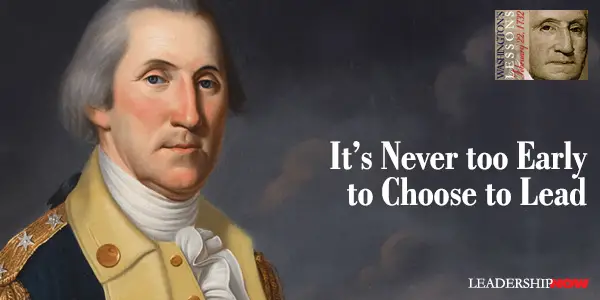 G
GREAT LEADERSHIP doesn’t just happen. Great leaders are revealed in extraordinary circumstances, but they are made long before. A person’s quality of leadership radiates from their character. Consequently, it’s never too early to begin your leadership development.
George Washington filled many roles in his lifetime: a surveyor, frontier explorer, businessman, land speculator, soldier, farmer and statesman. A couple of examples from Washington’s childhood help to explain his successes later in life.
By age sixteen, Washington had copied out by hand, 110 Rules of Civility & Decent Behavior in Company and Conversation. They are based on a set of rules composed by French Jesuits in 1595. The first rule sets the tone of the others that follow: “Every Action done in Company, ought to be with Some Sign of Respect, to those that are Present.” There isn’t a leader that wouldn’t benefit from a daily reminder of this approach. Time and time again, these rules from his childhood played out in the conduct of his public life and defined his reputation. These rules and his concern for them integrated him as a leader and bonded him with those he led.
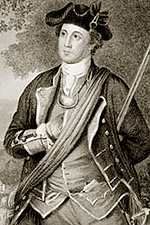 George Washington’s father died when he was eleven leaving him to be raised by his older brother Lawrence. By age fifteen his formal schooling was over and he had achieved the equivalent of only a grade school education. But his education never stopped. Washington was an avid reader, soaking up the works of historians and thinkers. He was especially drawn to the essays of the Roman philosopher Seneca and Joseph Addison’s play Cato with its lesson in selfless leadership. He studied the ideas of his contemporaries in writings and conversation. He also spent a good deal of time writing which helped to solidify his thoughts. Learning is more than discovery. It helps us to make sense of things. It’s more than collecting information—it is applying it in a constructive way to some area of our life.
It is the mindset of a leader to work on themselves harder than they work on others. A leader’s first responsibility is governing themselves. Historian Gordon Wood has written, “Washington became a great man and was acclaimed as a classical hero because of the way he conducted himself during times of temptation. It was his moral character that set him off from other men.”
Leadership is embodied in the way you look at the world and respond to it. It’s never too early to choose to lead.
* * *  Like us on Instagram and Facebook for additional leadership and personal development ideas.

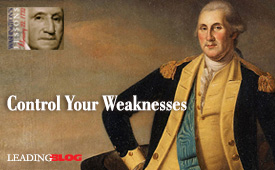 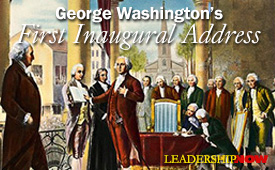
Posted by Michael McKinney at 12:01 AM
Permalink
| Comments (0)
| Leaders
, Washington's Lessons
11.12.10

30 Surprising Facts About George Washington
 I
IN Washington: A Life, Ron Chernow calls Washington “the most famously elusive figure in American history.” In 928 pages—the longest single-volume biography of Washington ever published—Chernow wants to render George Washington real and credible. And he succeeds. Chernow offers these facts about George Washington.
 - Washington was the only major founder who lacked a college education. John Adams went to Harvard, James Madison to Princeton, and Alexander Hamilton to Columbia, making Washington self-conscious about what he called his "defective education."
- Washington never had wooden teeth. He wore dentures that were made of either walrus or elephant ivory and were fitted with real human teeth. Over time, as the ivory got cracked and stained, it resembled the grain of wood. Washington may have purchased some of his teeth from his own slaves.
- Washington had a strangely cool and distant relationship with his mother. During the Revolutionary War and her son's presidency, she never uttered a word of praise about him and she may even have been a Tory. No evidence exists that she ever visited George and Martha Washington at Mount Vernon. Late in the Revolutionary War, Mary Washington petitioned the Virginia legislature for financial relief, pleading poverty—and, by implication, neglect by her son. Washington, who had been extremely generous to his mother, was justly indignant.
- Even as a young man, Washington seemed to possess a magical immunity to bullets. In one early encounter in the French and Indian War, he absorbed four bullets in his coat and hat and had two horses shot from under him yet emerged unscathed. This led one Indian chief to predict that some higher power was guiding him to great events in the future.
- By age 30 Washington had survived smallpox, malaria, dysentery, and other diseases. Although he came from a family of short-lived men, he had an iron constitution and weathered many illnesses that would have killed a less robust man. He lived to the age of 67.
- While the Washingtons were childless—it has always been thought that George Washington was sterile—they presided over a household teeming with children. Martha had two children from her previous marriage and she and George later brought up two grandchildren as well, not to mention countless nieces and nephews.
- That Washington was childless proved a great boon to his career. Because he had no heirs, Americans didn't worry that he might be tempted to establish a hereditary monarchy. And many religious Americans believed that God had deliberately deprived Washington of children so that he might serve as Father of His Country.
- Though he tried hard to be fair and took excellent medical care of his slaves, Washington could be a severe master. His diaries reveal that during one of the worst cold snaps on record in Virginia—when Washington himself found it too cold to ride outside—he had his field slaves out draining swamps and performing other arduous tasks.
- For all her anxiety about being constantly in a battle zone, Martha Washington spent a full half of the Revolutionary War with her husband—a major act of courage that has largely gone unnoticed.
- Washington was obsessed with his personal appearance, which extended to his personal guard during the war. Despite wartime austerity and a constant shortage of soldiers, he demanded that all members of his personal guard be between 5'8" and 5'10"; a year later, he narrowed the range to 5'9" to 5'10."
- While Washington lost more battles than he won, he still ranks as a great general. His greatness lay less in his battlefield brilliance—he committed some major strategic blunders—than in his ability to hold his ragged army intact for more than eight years, keeping the flame of revolution alive.
- Washington ran his own spy network during the war and was often the only one privy to the full scope of secret operations against the British. He anticipated many techniques of modern espionage, including the use of misinformation and double agents.
- Washington tended his place in history with extreme care. Even amid wartime stringency, he got Congress to appropriate special funds for a full-time team of secretaries who spent two years copying his wartime papers into beautiful ledgers.
- For thirty years, Washington maintained an extraordinary relationship with his slave and personal manservant William Lee, who accompanied him throughout the Revolutionary War and later worked in the presidential mansion. Lee was freed upon Washington's death and given a special lifetime annuity.
- The battle of Yorktown proved the climactic battle of the revolution and the capstone of Washington's military career, but he initially opposed this Franco-American operation against the British—a fact he later found hard to admit.
- Self-conscious about his dental problems, Washington maintained an air of extreme secrecy when corresponding with his dentist and never used such incriminating words as 'teeth' or 'dentures.' By the time he became president, Washington had only a single tooth left—a lonely lower left bicuspid that held his dentures in place.
- Washington always displayed extremely ambivalence about his fame. Very often, when he was traveling, he would rise early to sneak out of a town or enter it before he could be escorted by local dignitaries. He felt beleaguered by the social demands of his own renown.
- At Mount Vernon, Washington functioned as his own architect—and an extremely original one at that. All of the major features that we associate with the house—the wide piazza and colonnade overlooking the Potomac, the steeple and the weathervane with the dove of peace—were personally designed by Washington himself.
- A master showman with a brilliant sense of political stagecraft, Washington would disembark from his coach when he was about to enter a town then mount a white parade horse for maximum effect. It is not coincidental that there are so many fine equestrian statues of him.
- Land-rich and cash-poor, Washington had to borrow money to attend his own inauguration in New York City in 1789. He then had to borrow money again when he moved back to Virginia after two terms as president. His public life took a terrible toll on his finances.
- Martha Washington was never happy as First Lady—a term not yet in use—and wrote with regret after just six months of the experience: "I think I am more like a state prisoner than anything else… And as I cannot do as I like, I am obstinate and stay home a great deal."
- When the temporary capital moved to Philadelphia in 1790, Washington brought six or seven slaves to the new presidential mansion. Under a Pennsylvania abolitionist law, slaves who stayed continuously in the state for six months were automatically free. To prevent this, Washington, secretly coached by his Attorney General, rotated his slaves in and out of the state without telling them the real reason for his actions.
- Washington nearly died twice during his first term in office, the first time from a tumor on his thigh that may have been from anthrax or an infection, the second time from pneumonia. Many associates blamed his sedentary life as president for the sudden decline in his formerly robust health and he began to exercise daily.
- Tired of the demands of public life, Washington never expected to serve even one term as president, much less two. He originally planned to serve for only a year or two, establish the legitimacy of the new government, then resign as president. Because of one crisis after another, however, he felt a hostage to the office and ended up serving two full terms. For all his success as president, Washington frequently felt trapped in the office.
- Exempt from attacks at the start of his presidency, Washington was viciously attacked in the press by his second term. His opponents accused him of everything from being an inept general to wanting to establish a monarchy. At one point, he said that not a single day had gone by that he hadn't regretted staying on as president.
- Washington has the distinction of being the only president ever to lead an army in battle as commander-in-chief. During the Whiskey Rebellion of 1794, he personally journeyed to western Pennsylvania to take command of a large army raised to put down the protest against the excise tax on distilled spirits.
- Two of the favorite slaves of George and Martha Washington—Martha's personal servant, Ona Judge and their chef Hercules—escaped to freedom at the end of Washington's presidency. Washington employed the resources of the federal government to try to entrap Ona Judge in Portsmouth, New Hampshire and return her forcibly to Virginia. His efforts failed.
- Washington stands out as the only founder who freed his slaves, at least the 124 who were under his personal control. (He couldn't free the so-called 'dower slaves' who came with his marriage to Martha.) In his will, he stipulated that the action was to take effect only after Martha died so that she could still enjoy the income from those slaves.
- After her husband died, Martha grew terrified at the prospect that the 124 slaves scheduled to be freed after her death might try to speed up the timetable by killing her. Unnerved by the situation, she decided to free those slaves ahead of schedule only a year after her husband died.
- Like her husband, Martha Washington ended up with a deep dislike of Thomas Jefferson, whom she called "one of the most detestable of mankind." When Jefferson visited her at Mount Vernon before he became president, Martha said that it was the second worst day of her life—the first being the day her husband died.
   Like us on Instagram and Facebook for additional leadership and personal development ideas.
Posted by Michael McKinney at 05:50 PM
Permalink
| Comments (0)
| Leaders
, Washington's Lessons
, Weekend Supplement
01.03.10

George Washington's Rules of Civility and Decent Behavior
 If you're considering some personal development goals you couldn't go wrong reviewing the 110 Rules of Civility & Decent Behavior once copied down by George Washington.
If you're considering some personal development goals you couldn't go wrong reviewing the 110 Rules of Civility & Decent Behavior once copied down by George Washington.
By age sixteen, Washington had copied out by hand the 110 Rules of Civility & Decent Behavior in Company and Conversation. They are based on a set of rules composed by French Jesuits in 1595. Presumably they were copied out as part of an exercise in penmanship assigned by young Washington's schoolmaster. The first English translation of the French rules appeared in 1640, and are ascribed to Francis Hawkins the twelve-year-old son of a doctor.
Today many, if not all of these rules, sound a little fussy if not downright silly. It would be easy to dismiss them as outdated and appropriate to a time of powdered wigs and quills, but they reflect a focus that is increasingly difficult to find. The rules have in common a focus on other people rather than the narrow focus of our own self-interests that we find so prevalent today. Fussy or not, they represent more than just manners. They are the small sacrifices that we should all be willing to make for the good of all and the sake of living together.
Check them out at Foundations Magazine.
  Like us on Instagram and Facebook for additional leadership and personal development ideas.
Posted by Michael McKinney at 09:11 AM
Permalink
| Comments (0)
| Washington's Lessons
, Weekend Supplement
|
 |
BUILD YOUR KNOWLEDGE
ADVERTISE WITH US





How to Do Your Start-Up Right
STRAIGHT TALK FOR START-UPS



Grow Your Leadership Skills
NEW AND UPCOMING LEADERSHIP BOOKS

Leadership Minute
BITE-SIZE CONCEPTS YOU CAN CHEW ON

Classic Leadership Books
BOOKS TO READ BEFORE YOU LEAD
|
 |
|




